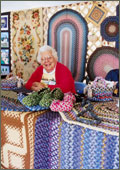NH at the Smithsonian Folklife Festival
Themes - Home, Town, & Community
Traditions are a part of people's ordinary lives. Because of this, they are woven into our homes, towns, and communities. Family, friends, and neighbors are all a part of the fabric needed to pass on traditions from one generation to the next. In the home, traditions can be expressed in a the customs and objects that fill it with beauty and meaning-cooking, handcrafted rugs, quilts, baskets, crochet work, furniture, special clothing, and adorn their walls.
Overview | A Day at the Festival | Program Book | Image Gallery | Themes | Participants, Presenters & Staff

Barbara Fisher
of Sunapee
preserves a tradition
based upon the
frugality and
practicality of early
New Englanders
who used
scraps of material
to create beautiful
rugs to furnish and
warm their homes.
Traditions extend to the way people create beauty on the outside of their homes too-they way they decorate their porches and yards, paint their houses, and garden. A typical New England porch may have hanging planters, flower boxes, a comfortable chair or two, and an emblem of national pride-the American flag. Some people take special pride in arranging traditional seasonal and holiday decorations and become known in their neighborhood for sharing this beauty with everyone.
Towns also keep traditions alive. In New Hampshire most of the towns are small. Even some of the largest cities, such as Concord, Nashua, and Portsmouth, have a small-town feel. Traditionally, many New Hampshire towns are arranged around a central square or "town common," often with a gazebo or bandstand and flanked by one or more churches, a town hall, historic commercial buildings, and stately homes. Celebrations such as Old Home Day, dog sled races, firemen's musters, and winter carnivals are enjoyed and cherished throughout New Hampshire.
Even though New Hampshire has its share of strip malls and fast-food restaurants, towns are taking renewed interest in their historic main streets and attracting businesses that focus upon New Hampshire's heritage, such as shops that carry handmade crafts and home-baked goods.
"Community" can mean different things, but for most people it means people being willing to help a neighbor, solve problems, make decisions, and worship together, and share in celebrations. In New Hampshire the sense of community is strong-whether it is civic pride in a town, membership in a recreational or fraternal organization, or birthright into an ethnic group. For many people, community in New Hampshire is best experienced at a farmer's market, a church sponsored activity, the local general store, at town meeting, or an old favorite for catching up on local news-the town dump.
1999 Smithsonian Folklife Festival
Traditions represented in this area were:
- Cooking and gardening.
- Domestic crafts of rug making, quilting, spinning, knitting, and wreath making.
- Crafts that help define spiritual beliefs and support celebrations such as Jewish prayer shall weaving, embroidered icons for the Russian orthodox faith; and Chinese knot tying.
- Crafts that symbolize communities such as carved signs, Colombian miniatures, and dolls.
- New Hampshire's political heritage.
Festival Site Description:
The entryway to this theme area was a Shaker gate mounted on granite posts.
The hub was a gazebo decorated with traditional colonial bunting surrounded by granite benches.
This theme area had three areas that were scheduled with performances and demonstrations that were set up at both the 1999 Smithsonian Folklife Festival and the 2000 Celebrate New Hampshire festival:
The Front Porch music stage.
This was an area for small music performances. For the Smithsonian Folklife Festival, this was built in the style of a "Federal period" porch. Historic restorationists David Adams and Steve Roy of Portsmouth helped give the porch its authentic look. For the Celebrate New Hampshire Festival, this was built in the style of a federal period New Hampshire Front porch. Department of Corrections work force built the authentic porch that remains today on the Hopkinton State Fairgrounds.
The New Hampshire Kitchen
This was an area for foodways demonstrations and it included a full stove, sink, refrigerator, displays of antique kitchen tools, jams & jellies, table, dishes, and lots and lots of food.
The Political Traditions Stage
This was an area for political discussions that focused upon the heritage of town meeting, first in the nation primary and the largest bicameral legislature in the country-New Hampshire's!
2000 Celebrate New Hampshire Festival
Tradition represented in this area were the same as those presented at the 1999 Smithsonian Folklife Festival with the addition of:
- Greek orthodox plate painting
- Sheep to shawl demonstration
Festival Site Description:
The theme gateway and scheduled venues were the same as those presented at the 1999 Smithsonian Folklife Festival.
Photo credit: Lynn Martin Graton
New Hampshire State Council on the Arts
19 Pillsbury Street - 1st Floor, Concord, NH 03301


